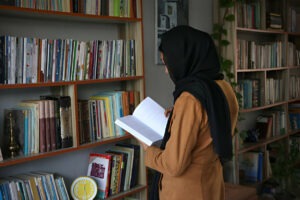ISLAMABAD (SW) – A number of Afghan female refugees in Pakistan say they are faced with so many types of psychological problems these days.
Mursal, a mother of three daughters who now lives in Pakistan’s capital Islamabad, said her daughters missing on education and the harsh economic conditions in Pakistan have left her depressed. She said: “Afghan women have many problems here, visa problems, economic problems, no progress on visa applications. I worry a lot, I think we got nervous pressure and the doctor gave me anti-depressants.”
Most of the Afghan female asylum seekers in Pakistan are worried about the possibility of receiving a negative response from the embassies of foreign countries and returning to Afghanistan – a concern that has made them depressed.
Shazia, a former employee of the Ministry of Defense in the previous government, who came to Pakistan with her two sisters after the fall of the republic, said that being away from her family and having no destiny has made her feel hopeless about life. She said she has been living away from her family for 11 months and is also suffering from economic problems.
Lida Rahimi, another Afghan refugee in Pakistan, who is 22 years old and worked in a local media in Parwan during the previous government, said that a year away from home, and faced with the pressures of migration made her suffered from depression to the extent that to escape from these problems, she sometimes even thinks about suicide.
“When I think, I don’t have freedom and security and I lost all my achievements, it’s really hard for me,” she said. “It makes me lose my mental state and consider myself an empty person, I feel like I am in captivity and waiting for my death.”
At the same time, a number of psychologists mention deprivation, isolation and migration as factors that make people suffer from mental illnesses and depression.
Javed Arefi, a psychologist, said: “When a person is far from his homeland, he finds himself in an unfortunate situation, he feels emotionally lacking and as a result, he suffers from depression.” According to Arefi, economic problems in exile can also contribute to depression.
After the fall of the previous government, a large number of civil activists, military personnel of the previous government and journalists were displaced to other countries, especially Pakistan and Iran, where they are now living with many problems. According to the latest statistics, about 1.3 million Afghan immigrants have been registered in Pakistan while more than 300,000 of them have entered this country in the last year and a half alone.
ENDS






